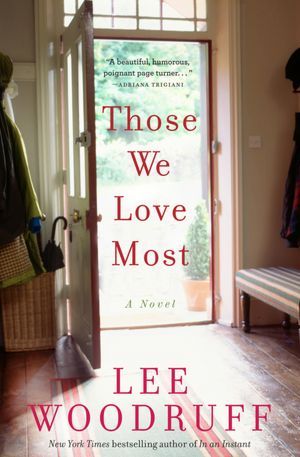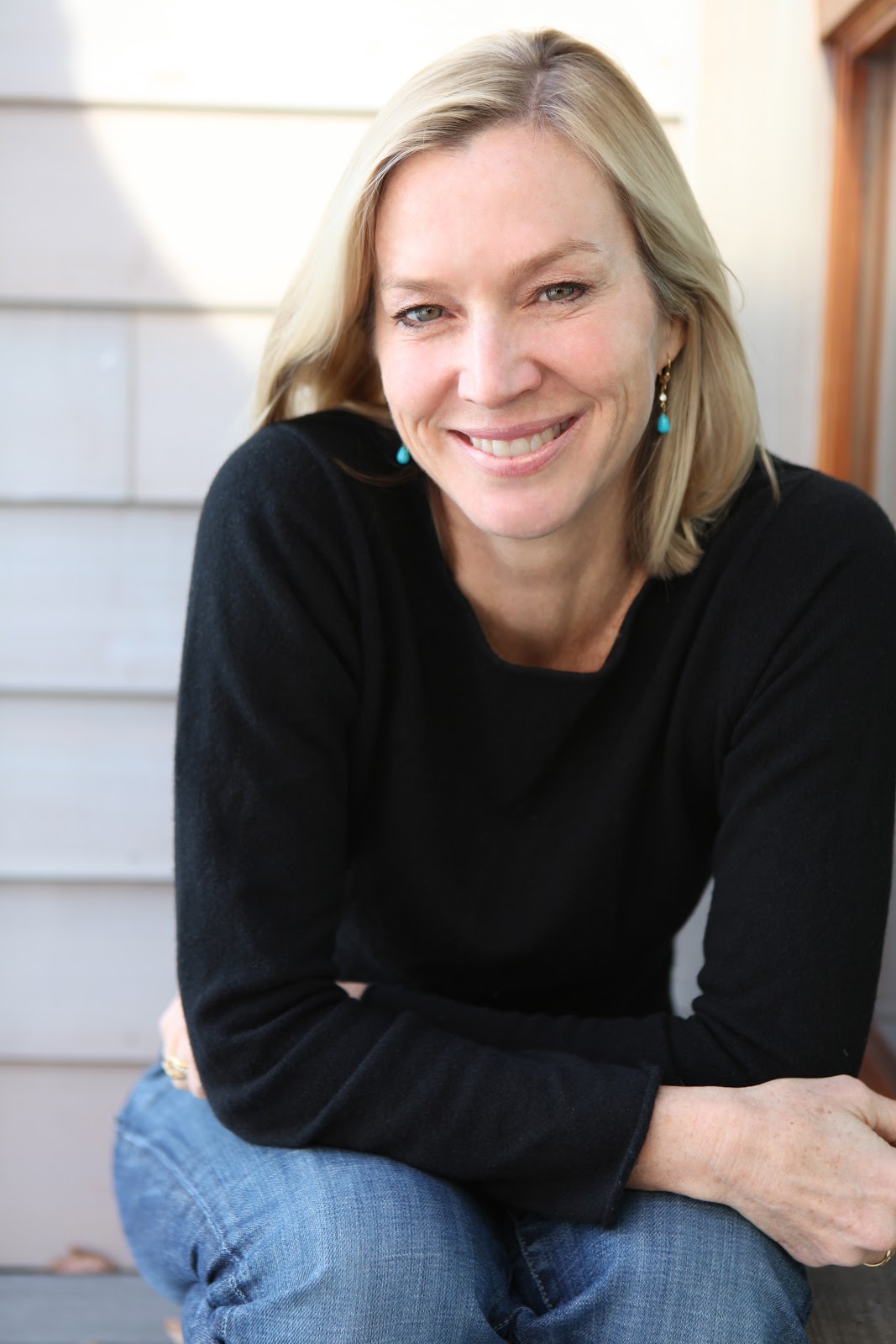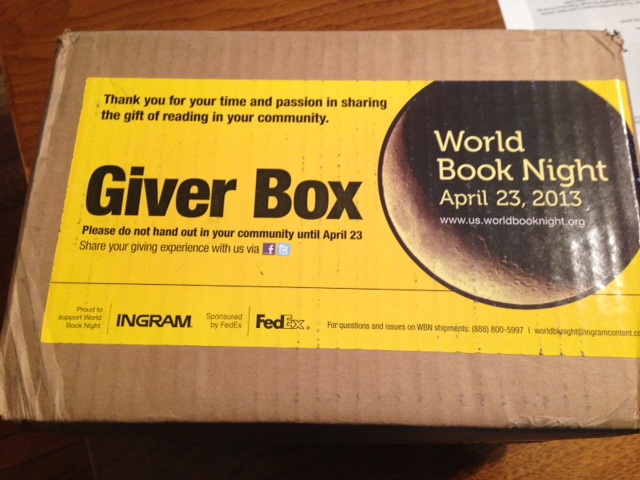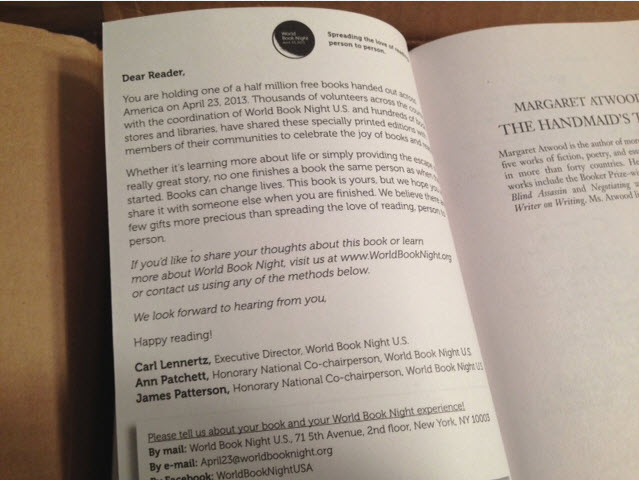I've known Lee Woodruff for years through a cyber-friendship. We recently met "in real life" at a signing event for this new book. I'm thrilled that Lee agreed to provide a recipe for my book review, and to a quick interview that I've included at the bottom of this post.
Review: Those We Love Most
by Lee Woodruff

The blink of an eye. That saying may be a clich
é, but as we learned from the news about Boston last week, it truly takes just a brief moment to change everything. And the ripples from a tragic event can shake the foundations of even the closest relationships.
When I hear about those awful events, and about the people that sometimes cause them, I think of the families, and how they must be coping - or not coping - with the aftermath.
Tragedy and family are at the core of this touching book, an examination of how we react and move on when all that we know is challenged.
One quick and painful mistake sends shockwaves through Maura Corrigan's family, shattering her carefully constructed fa
çade of a perfect life.
The effects of that single event open a Pandora's box of secrets for Maura, her husband Pete, and even her parents, as they all struggle to recover from their grief and pain.
Far from a "heavy" tragic tale, though,
Those We Love Most examines the struggles that families face, the way we knit our relationships back together after a roadblock knocks us apart, and how, in the end, we can emerge individually stronger and, perhaps, closer than before.
Woodruff is an unfortunate authority on this topic, having been through her own well-documented and difficult tragedies. But she writes with warmth and humor, offering the comfort of a close friend who holds your hand in dark hours, and makes you laugh when you truly need it.
Those We Love Most is now available in paperback from
Hyperion/Voice.
Recipe: Lee Woodruff's Asparagus Artichoke Salad
My thanks to Lee Woodruff for providing this accompaniment to Those We Love Most
. She says this is a spring salad recipe one could find on the Corrigan table at a family gathering. It is also a preferred one for Lee and her sisters.
Prep time: 10 minutes. Cook time: 12 minutes
INGREDIENTS
1 large shallot, sliced thin (can sub a few thin slices of red onion or some sliced spring onion)
2-3 Tbsp lemon juice
2 pounds thick asparagus, rinsed, tough ends broken off and discarded (or saved for stock). Note: Thick asparagus spears are easier than thin to roast or grill without becoming too dry or over-cooked.
2 Tbsp olive oil, divided
Salt
1 teaspoon garlic powder
1 pint grape or cherry tomatoes, sliced in half
1 15-ounce jar of good quality marinated artichoke hearts, quartered or cut in half (depending on the size of the artichokes)
METHOD
Soak the sliced shallots in the lemon juice as you get ready to make the rest of the salad. To roast the asparagus, preheat the oven to 400°F. Coat the asparagus spears with 1 Tbsp of olive oil, and salt them well. Place in a single layer in a foil-lined roasting pan, and cook for 8-10 minutes until lightly browned and fork-tender. To grill the asparagus, prepare your charcoal or gas grill for high direct heat. Coat the asparagus with 1 Tbsp of olive oil and sprinkle with salt. Grill them until nicely charred and fork tender, between 5 to 10 minutes. Remove the asparagus from the oven or grill and cut into bite-sized pieces. Put the asparagus and all the remaining ingredients into a large bowl and mix to combine. Add as much of the marinating liquid from the jarred artichokes as you like. Serve chilled or at room temperature.
Yield: Serve 6-8 as a side dish.
An Interview with Lee Woodruff
 |
| Cathrine White Photography |
Read Eat Think: You've written non-fiction before; did you have any reservations or concerns about moving into fiction?
Lee Woodruff: Not at all. This is exactly what I have always wanted to do - make up stories. And while writing fiction was more challenging than non-fiction, it was incredibly enjoyable for me to make up a story, create dialogue, and get the characters to play well together.
RET: Even though this book is fiction, it's usually the case that authors find their best stories in reality. What events or characters in your own life wove themselves into this book?
LW: Most authors I know use their own lives and experiences in some way to inform their writing. The premise of the book, that a teenager inadvertently hits a child while driving a car, is something that happened a few towns over in real life. I received a phone call that the child's parents, whom I didn't know, wanted to speak to me about his injuries as I had been through a traumatic brain injury with my husband. I never ended up talking to them but the phone call about the accident stayed with me. I thought about all the people that one random act would affect and then I began writing.
Some of the scenes in the hospital, the familiarity with loss and grieving...I drew on my own experiences for that.
RET: You've received a lot of praise for Those We Love Most. What is it like to read incredible quotes about your work like those you've received from Harlan Coben, Sue Monk Kidd, and Alice Hoffman?
LW: It's pretty freaking humbling. I'm still pinching myself.
RET: Tell me about your writing process - do you have a particular time of day that you like to write, or a particular place? Do you listen to music?
LW: Boy, do I wish I had a routine! Some day...
I can't wait to write every single day. Or almost. I think every writer needs to take sabbaticals where the creativity whip isn't at your back. Right now, with kids at home and a day job, I describe my non-existent writing routine as “writing in the margins of my life.”
Most of this book and the one before it were written largely on planes and in hotel rooms. That’s my best place to write with no distraction. Having more of this time will be one of the bright sides of being an empty nester in a few years. I used to write with soap operas on in the background for company, believe it or not, but now after four kids my most blissful noise is..... silence.
RET: What are your favorite books?
LW: My MOST favorite of all time, and I wrote a blog about re-reading it 20 years later, is Wallace Stegner's Crossing to Safety. I loved Ian McEwan's Enduring Love, and Map of the World by Jane Hamilton. I love anything by Nora Ephron and David Sedaris. I have so many that I've started a list.





.jpg)






